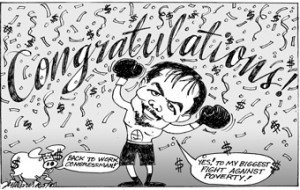Slipping ratings
THE NET satisfaction rating of the Aquino administration, as measured in the Social Weather Stations survey conducted from March 4 to 7 this year, shows a steep drop, from 64 percent in the last quarter of 2010 to 46 percent in the first quarter of 2011. This is yet another wake-up call for the administration, but before we speak of decisive next steps to be taken, it is our responsibility to identify exactly which alarm bells are ringing.
We can take a closer look at what may be the the real measure of political support, the “gross” satisfaction or dissatisfaction ratings themselves, the survey findings from which the net ratings are computed.
In the Nov. 27-30, 2010 SWS survey, a remarkable 74 percent of respondents, equivalent to about three-fourths of all voting-age Filipinos, said they were satisfied with the general performance of the Aquino administration. In the March 4-7, 2011 survey, the number fell to 65 percent; that is to say, “only” about two-thirds of all Filipino adults said they were satisfied.
The decrease in “gross” satisfaction ratings is roughly mirrored in the increase in “gross” dissatisfaction ratings. In November, only 10 percent of respondents—one in every 10 Filipino adults—said they were dissatisfied with the general performance of the administration. By March, the number had risen to 18 percent, or almost two in every 10 voting-age Filipinos.
In other words, it is erroneous to use the new net satisfaction rating of plus-46 as though it meant that President Benigno Aquino III’s political support had fallen below 50 percent. In fact, the administration still enjoys majority support, with 65-percent satisfaction. But the administration should be troubled by the near-doubling in the dissatisfaction rating; this is where opposition protests and street demonstrations will source their ranks from.
It is equally erroneous to assert that President Aquino’s high-visibility campaign to impeach Merceditas Gutierrez failed to prevent the drop in the administration’s ratings. In the first place, the House of Representatives overwhelmingly impeached Gutierrez only on March 22, three weeks after the latest SWS survey was conducted. Gutierrez announced her resignation as ombudsman in the last week of April, or eight weeks after the survey. Her resignation took effect on May 6, a full two months after the SWS survey. To find out the impact of President Aquino’s get-Merci campaign, we would need to wait for the next poll, not extrapolate from the last one.
In the second place, the SWS survey has a specific question related to graft and corruption, the main issue which fueled the rise of the second Aquino presidency. As far as “Eradicating graft and corruption” is concerned, the Aquino administration reached a record high of plus-22 in the September 2010 survey, the first quarterly poll SWS conducted after President Aquino took office. That same high was reached again in November, before falling down to plus-14 in March. Because the record high of plus-22 was achieved after the Arroyo administration ended its extended term in June 2010 with a negative-27 rating in “Eradicating graft and corruption,” we can draw two lessons from this series of numbers: The public is solidly behind the Aquino administration’s central campaign promise. But the administration’s follow-through on the promise is beginning to prompt some public disappointment.
That sense of disappointment, however, may lie partly in the perception, in early March 2011, that Gutierrez would fight tooth and nail to hold on to her position—and thus continue to stymie the campaign against corruption. It remains to be seen whether the presidential pressure that led to her resignation will have an impact on the administration’s numbers in “Eradicating graft and corruption.”
In other words, it is premature to throw in the towel as far as fighting corruption is concerned. If anything, the Aquino administration must step up the fight, now that Gutierrez is out of the way. But the administration must realize that anti-corruption initiatives alone, or enhanced public relations, won’t be enough. It must weed out the incompetent (starting with those responsible for the continuing delay in presidential appointments). It must work faster to stop or mitigate the rise in consumer prices, including getting tough with the oil firms. Not least, it must create a reputation for demanding the very best, from the people as well as from itself.
















